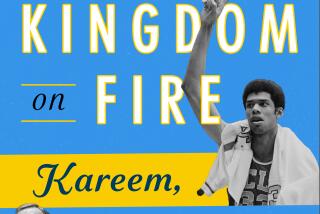A Child of Poverty Finds Wealth in Giving
- Share via
On Skid Row, they wait for Horace. In the projects, they wait for Horace. The kids keep looking for him. They would prefer Michael, but Michael’s always so busy, and Michael’s more of a god. Horace is regular people. They can intercept Horace’s car. They can shout at him: “Any tickets?” They can sit beside Horace and ask him how he got to be where he is, who he is, how he is.
And Horace is there for them, wherever and whenever possible. He and his twin brother Harvey were raised in poverty.
“Not this city poverty,” Horace says. “More like country poverty.”
But they never had much. Their parents were divorced when the twins were 8. And their mom put four kids through school on welfare.
So, Horace Grant made himself a promise.
“You better give something back,” he said. “You better do something in this world other than be able to hit the jumper.”
So, this player who has done so much for the Chicago Bulls, in and out of uniform, on their way to fame and fortune, will make a special point of rapping with some of the West Side waifs who hang around Chicago Stadium because they have nowhere better to hang around, even if the NBA championship series never returns to Chicago.
“One of the ridiculous things about our success is that there are people living right across from the stadium who have never been inside the stadium,” Grant said Tuesday before practice at the Forum. “One or two people, whether it’s myself and Michael Jordan or Craig Hodges or anybody, can’t do anything about changing everybody’s life, but the least we can do is go over and talk to them once in a while, be a decent human being.
“Whenever I see a kid in poverty, I think about how my life could have turned out, how things could have been for me and my brother. We grew up hard. Maybe not in the slums, but in a sort of Mayberry small town where an extra dollar is hard to come by. Now I see these kids outside the stadium and I’d like to take home every one of them.”
Horace and Harvey Grant are, with Tom and Dick van Arsdale, the only twins ever to have played in the NBA. They have both done well, Harvey with the Washington Bullets, and when they speak to one another, as they do constantly, they kid around the way kids will do and needle one another and make bets over who will do something first. Harvey soon might be paying up on the one that had him being first to wear a championship ring.
But then, just when all the successes and excesses of big-time basketball start being taken for granted, something nags at the Grants, takes them back to harder times. By last summer, it wasn’t only a lack of a ring that left Horace Grant feeling unfulfilled. Or the fact that his bosses asked him to concentrate on defense and rebounding and let Jordan and Scottie Pippen do the scoring.
No, it was more than that.
“When you have money, and cars, and clothes, and all those materialistic things, and you’re still not happy, then something is definitely wrong,” Horace said.
He asked his wife to be understanding. Asked her to put off their summer vacation. Asked her to afford him the space to go off for hours on end to hoist weights and improve his body. Asked her to accompany him to the Pentecostal church to change his faith and improve his soul. The physical improvement made him a better player. The spiritual improvement made him a better person. He adjusted his thinking. He accepted who he was. He even stopped vainly refusing to wear prescription goggles, since his eyesight is poor and he has an aversion to contact lenses. When Horace Grant says his objective in a basketball series is “not to lose focus,” he may be the only man in the NBA who means it literally.
“I can’t begin to explain what kind of difference my new faith has meant to Horace Grant,” says Horace Grant. “When you get pushed around for a living, whether it’s under a basket or elsewhere, you get angry and feel the need to push back. Sometimes it spills over into your personal life, and, well, that’s not good. I feel like I’ve turned my life around.”
So, Horace would like to thank his brother, for being “more nervous than I am.”
He would like to thank his mother, for being there.
He would like to thank his wife, and make up that vacation to her.
And he would like to thank those children of the slums, those street urchins, those dead-end kids whose jeans aren’t ripped at the knee on purpose, for the time they have given him. And he would like to do it in person. And as soon as possible. Because that’s the kind of person Horace Grant is, or at least is trying very hard to be.
More to Read
Go beyond the scoreboard
Get the latest on L.A.'s teams in the daily Sports Report newsletter.
You may occasionally receive promotional content from the Los Angeles Times.










